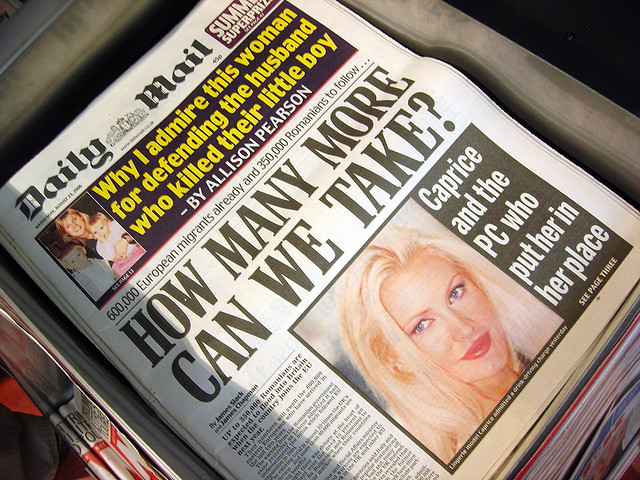
Photograph by Gideon
It has emerged that Home Office staff are being rewarded for ensuring that asylum seekers fail in applications to remain in the UK. Immigration staff are reportedly set a 70% success target in tribunal cases which if met can bring rewards including shopping vouchers, extra holidays and cash bonuses. High street vouchers worth between £25 and £50 were given out to ‘recognize positive performance over a short period of time.’ This should come as no surprise given that this government is clearly not one that sympathises with asylum seekers, many of whom are fleeing war torn counties, awful living conditions and the threat of persecution at home.
The debate surrounding immigration and asylum seekers is typically skewed in the extreme. Many blame the Daily Mail and other right wing media outlets, but the government and politicians are equally complicit in the smokescreen that has been created to steer us away from the facts and into the realm of dangerous and unfounded rhetoric, that at best is xenophobic and at worst is stirring up racial hatred. The latter was highlighted in the Independent recently where it was revealed that anti-immigration discourse is contributing to high levels of racism within British class rooms, with counselling being sought for racist bullying up 69% in 2013.
Ordinary Britons are duped and are resultantly left bemoaning immigrants for taking their jobs, driving down wages and contributing to a loss of ‘British culture’ (whatever that even means). Various studies, including this one by LSE, debunk many of the myths presented by the press and parliamentarians, yet they are given little weight in public debates. The LSE study, for example, flies in the face of alleged ‘benefit tourism’, highlighting how recent waves of immigrants have contributed far more in taxes than they have taken in benefits, making a net contribution of £22.1 billion to the UK economy between 2001 and 2011. The authors concluded that in light of their findings claims of ‘benefit tourism’ are simply ‘disconnected from reality’.
Former World Bank economist and Oxford professor Paul Collier touched on some of these debates in his recent book ‘Exodus: How Migration is Changing our World,’ Speaking about ‘Exodus’ in a lecture at LSE in late 2013, Collier stated that there is ‘no evidence’ that immigrants drives wages down for ‘natives’. Collier went as far as to say that ‘if anything it pushes them up.’ Collier’s appraisal of current debates was poignant as he noted that current initiatives are a ‘tragedy’ and are ‘disastrously mis-designed’ as a result of ‘pressure from the tabloids’, rather than sensible analysis.
Collier accurately noted that rarely, if ever, do we get sufficient context to immigration debates. In his own analysis he highlighted that fundamentally immigration is fuelled by a large income gap between the rich countries and the poor countries, noting that until this gap is closed, immigration will continue to rise.
The wealth of nations
Surely then policy makers wishing to reduce net immigration should look at measures to reduce gaps in affluence between rich and poor nations. Doing this though would potentially raise awkward questions about how the wealth gap appeared in the first place. Ideas about European and western superiority would be quickly debunked with a brief history of colonialism. Pioneering post-colonial scholar Walter Rodney explored these debates in his ground-breaking, How Europe Underdeveloped Africa. The book, as many other scholars will now corroborate, show that Europe’s development was at the expense of Africa. European extraction of labour and resources helped the continent to industrialise, whilst impoverishing Africa and leaving behind legacies not conducive to a peaceful or prosperous future.
Great parts of the world, largely out east, are unstable as a result of colonialism and even neo-colonialism. The colonial period in India, for example, contributed to the dividing of the ‘British Raj’ into Pakistan and India, something that has been a cause of widespread poverty, instability and conflict ever since – and which led to many South Asians migrating to the UK. This is against the back drop of pre-colonial India possessing more wealth than Britain, in fact it is estimated that India and China combined contributed up to 70% of the World’s total GDP during the 17th century.
The construction of borders and artificial boundaries in many sub-Saharan African and Middle-Eastern states has pitted ethnic groups against each other, leading to violence and even genocide. Such instability and related poverty has been a critical factor in encouraging people to leave for the more prosperous west. Yet, despite profiteering and ‘developing’ at the expense of the ‘rest’, western states are reluctant to accept immigrants and asylum seekers and are even more reluctant to acknowledge their own historical role in creating a global order that has led to this.
In this context, is it really fair for the Home Office to incentivise their workers to remove asylum seekers from say Afghanistan or Iraq, when the UK is responsible for obliterating large parts of both countries in what was described by the then UN General Secretary Kofi Annan as an ‘illegal war?’ Bashir Assad in Syria was propped up by the United Kingdom’s government for many years, yet now the UK is washing it’s hand of Syrian asylum seekers and refugees, adopting a ‘no room at the inn’ policy. Some responsibility has to be taken and with regards to Syria, Iraq and Afghanistan, Britain is quite clearly responsible for the unsettlement and displacement of many individuals and families.
The sorry truth is that few people are aware of the extent to which Europe was able to profiteer at the expense of its colonies. Many people simply believe colonialism to be in the past, and do not recognise its enduring legacies. This study by Greg Philo corroborates how many ordinary people have a ‘negative’ view of the developing world because of a lack of context and explanation when developing countries are examined in the media. Michael Gove’s white-washing of the history curriculum in schools will probably only exacerbate this further.
Where next?
Attention needs to be paid in debates on immigration and asylum seekers to the role that British foreign policy has played, both past and present, in both fostering a situation where there a huge wealth gap between Britain and many developing economies, and creating economic deprivation and political instability in these countries in the first place. It is too easy to present immigrants as people who are coming to the UK to steal and benefit at the expense of ‘native’ Britons, when in reality they are people escaping economic hardships that are often the result of British policies past and present. Whilst current policy makers are not responsible for the actions of those before them, they should acknowledge how this has contributed to the status quo, rather than hiding behind and fuelling right wing tabloid hysteria.
A guilt ridden open door policy is simply not viable, but something does need to be done to redress past wrongs and also help reduce the wealth gap between nations that as Collier noted is fuelling migration from East to West. Only when that occurs, will things work out, in the mean time we need a fairer and less distorted debate both in parliament and in the press that truly contextualises the issue of migration.
Written by Amit Singh
Amit Singh works on the World Views of Nature project and is also the editor and founder of Think Football. Follow him on Twitter @Think_Football.




